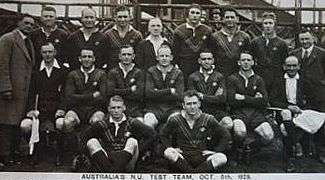Bill Shankland
| Personal information | ||||||
|---|---|---|---|---|---|---|
| Full name | William Shankland | |||||
| Born | 25 July 1907 Bondi, New South Wales, Australia | |||||
| Died | 8 September 1998 (aged 91) Warrington, Cheshire, England | |||||
| Playing information | ||||||
| Height | 5 ft 10 in (178 cm) | |||||
| Weight | 12 st 8 lb (80 kg) | |||||
| Position | Centre, Wing | |||||
| Club | ||||||
| Years | Team | Pld | T | G | FG | P |
| 1927–28 | Glebe | 13 | 2 | 1 | 0 | 18 |
| 1929 | Easts (Sydney) | 9 | 10 | 2 | 0 | 34 |
| 1930 | Leeton | |||||
| 1931–38 | Warrington | 231 | 74 | 70 | ||
| Total | 253 | 86 | 73 | 0 | 52 | |
| Representative | ||||||
| Years | Team | Pld | T | G | FG | P |
| 1928–30 | New South Wales | 5 | 3 | 0 | 0 | 9 |
| 1929 | City NSW | 1 | 1 | 0 | 0 | 3 |
| 1929–30 | Australia | 4 | 3 | 0 | 0 | 9 |
| 1930 | Country NSW | 1 | 1 | 0 | 0 | 3 |
| 1936–37 | Dominion XIII | 2 | 0 | 0 | 0 | 0 |
William Shankland (25 July 1907 – 8 September 1998) was one of Australia's great all-round sportsmen. An Australia national and New South Wales state representative three-quarter back, he played his club football in Sydney, country New South Wales and then in England, where he became a Warrington Hall of Fame inductee.[1] Shankland remained in England and became a renowned golfer and golf teacher.
Early life
Shankland was born in Sydney, New South Wales. He is said to have been an accomplished swimmer, boxer and cricketer, as well as footballer.
Rugby league career

Shankland played for the Glebe and Eastern Suburbs clubs in rugby league. While playing for Glebe in 1928, the 21-year-old was selected to make his state debut, the following year, moving to the Eastern Suburbs club, Shankland was selected for the 1929–30 Kangaroo tour of Great Britain. The winger played in all 4 test matches and was the leading try scorer on the tour with 24.
On tour, Shankland was pursued by English clubs but returned to Australia, captain-coaching Leeton's club in the Riverina.[2]
In 1931 Shankland signed for Warrington. The 'fleet of foot' wing-three-quarter made 231 appearances for that club, scoring 74 tries and 70 goals. He led Warrington in 2 Wembley cup finals, becoming the first Australian to do so, as well as captaining the side in 2 English Championship finals.
Bill Shankland played in Warrington's 10-9 victory over St.Helens in the 1932 Lancashire Cup final during the 1932–33 season at Central Park, Wigan on Saturday 19 November 1932, and played Right-Wing, scored a conversion and was captain in the 8-4 victory over Barrow in the 1937 Lancashire Cup final during the 1937–38 season at Central Park, Wigan on Saturday 23 October 1937.
The 1937 season saw him lead Warrington to victory over Barrow in the Lancashire cup final. The 1937 was his last in rugby league, his retirement allowed him to concentrate on his other sporting passion – golf.
Golf career
In the years 1937 to 1956 Shankland appeared in every Open Championship except 1948 when he failed to qualify. His best finishes were third, fourth and sixth. His best chance of winning was at Royal Liverpool Golf Club, Hoylake in 1947. Although four strokes behind after three rounds he took 34 for the first 9 holes and then scored 3-3-3-3 to be in a very strong position but finished 5-6-5-3-5 for the last five holes to finish with a 70. Shankland was one of the early starters and his score of 295 was the leading score at the time. His 70 turned out to be the best round of the day but left him two shots behind the eventual winner, Fred Daly.
From golfing exhibitions, Shankland raised almost a million pounds for charity.
Tournament wins
- This list may be incomplete
- 1948 Leeds Cup
Results in major championships
| Tournament | 1937 | 1938 | 1939 | 1940 | 1941 | 1942 | 1943 | 1944 | 1945 | 1946 | 1947 | 1948 | 1949 | 1950 | 1951 | 1952 | 1953 | 1954 | 1955 | 1956 |
|---|---|---|---|---|---|---|---|---|---|---|---|---|---|---|---|---|---|---|---|---|
| The Open Championship | T42 | 18 | T3 | NT | NT | NT | NT | NT | NT | 13 | 4 | DNP | T11 | CUT | T6 | CUT | 41 | 41 | T37 | T40 |
Note: Shankland only played in The Open Championship.
DNP = Did not play
CUT = missed the half-way cut
NT = No tournament
"T" indicates a tie for a place
Yellow background for top-10
Death
Shankland died of heart failure in Warrington, Cheshire, aged 91.
References
- ↑ "Hall of Fame at Wire2Wolves.com". wire2wolves.com. 2011-12-31. Retrieved 2012-01-01.
- ↑ Whiticker, Alan. "Bill Shankland". rugbyleagueproject.org. Shawn Dollin, Andrew Ferguson and Bill Bates. Retrieved 5 February 2014.
- The Encyclopedia Of Rugby League Players; Alan Whiticker & Glen Hudson
- The Guardian (Warrington newspaper)
- The Independent (London newspaper)
External links
- Obituary from The Independent (London newspaper)
- Bill Shankland Statistics at rugbyleagueproject.com
- Hall of Fame at Wire2Wolves.com